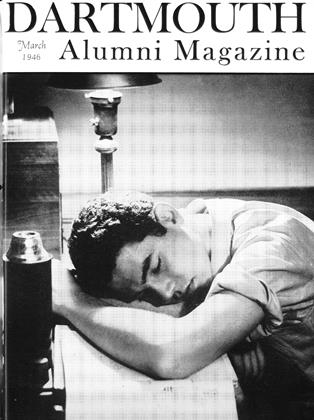Beginning a series of articles, with no punches pulled, on fundamental issues of the day and the relation of postwar Dartmouth to them—in an effort to search out the vitality of the liberal arts college in a changing world
DARTMOUTH, along with many other colleges, has sought in the past to maintain a live and strong intellectual relationship between itself and its alumni. As we turn into what are probably the most decisive peacetime years this College and this country have ever known, it is worth asking whether this is a natural and necessary part of the College's function.
To some extent at least such a relationship is a natural outgrowth of the tie which originally brought the College and ourselves together; namely, a desire to share an educational experience in which things of the intellect were a matter of mutual concern. Mistakes have been made on both sides of this relationship, but by and large whatever else may be the function of the college—and there are many other aspects of the complete man which are developed and find expression in college—in any final reckoning the college exists because of this mutual concern that men should be aided to the fullest development and beneficial use of the brains which, as it's usually put, God gave them. This, however, as all commencement speakers proclaim, is the work of a lifetime. The most any college can hope to do in four years is to send men out with an acquired taste for thinking.
There is another aspect of the matter which is especially important to colleges such as Dartmouth which depend primarily upon living men rather than a portfolio of stocks and bonds for their support and growth. Such a college cannot be unmindful of the fact that its character could not for long be something foreign to the character of its source of support. It cannot and it never must accept the role of merely mirroring its imperfect and storm-buffeted products, but neither can it ever free itself entirely from the two-way implications of such a personal relationship as exists between this College and her alumni.
One of these implications is that Dartmouth, in its highest self-interest, can nevex be indifferent to the way her sons regard the world in which they live. For better or for worse, she will always be not only known by the intellectual and spiritual company her sons keep; she will in truth in some measure be what her sons are.
And then there's the College's task in the largest sense. Holding, as Dartmouth does, that the major obligation of the liberal college still is to human society, she cannot with much reason view that obligation as finally satisfied by one four-year period out of an intimate relationship which usually covers fifty years and more. In his inaugural address thirty years ago, President Hopkins went to the point with these words:
If the College, then, has conviction that its influence isworth seeking at the expense of four vital years in theformative period of life, is it not logically compelled, tosearch for some method of giving access to this influenceto its graduates in their subsequent years!
It is increasingly clear that the central need of human society today is to develop leadership adequate in both quality and numbers to working out democratic solutions for our most fundamental problems within a time limit which even the most courageous hardly dare face. For my part I am certain that the time factor is now determinative. Certain minimum essentials in the moral and political control of power must either be achieved in our time or at least so actively sought that the initiative in fashioning the course of human affairs is kept in the hands of the enlightened and the well-intentioned.
This College, with its alumni body distributed in every state of the union, is in a position of unique opportunity to exert not only a future but a contemporaneous influence on our public affairs. We dare not underestimate the weight that a few well-placed, well-informed and purposeful men can lift. Dartmouth, therefore, intends to be insistent in its search for making ever more effective the two way intellectual relationship between the College and its alumni. I welcome with enthusiasm the step in this direction now being undertaken by our principal liaison facility, the ALUMNIMAGAZINE. There will be others.
PRESIDENT JOHN SLOAN DICKEY
 View Full Issue
View Full Issue
More From This Issue
-
 Class Notes
Class Notes1918
March 1946 By ERNEST H. EARLEY, DONALD L. BARR -
 Article
ArticleA Very Wise Man Once Gave Me a Gloomy Warning
March 1946 By WILLIAM H. MILLER JR. '49 -
 Class Notes
Class Notes1917
March 1946 By MOTT D. BROWN, DONALD BROOKS -
 Article
ArticleHANOVER HOLIDAY 1946
March 1946 By PROF. HERBERT W. HILL, -
 Class Notes
Class Notes1911
March 1946 By NATHANIEL G. BURLEIGH, EDWIN R. KEELER -
 Class Notes
Class Notes1919
March 1946 By J. KENNETH HUNTINGTON, MAX A. NORTON
Article
-
 Article
ArticleTHE TIE THAT BINDS A COLLEGE CLASS
January 1917 -
 Article
ArticleDR. ARTHUR RUGGLES '02 MENTAL HYGIENE CONSULTANT
February, 1924 -
 Article
ArticleAmericans United
December 1944 -
 Article
ArticleLittles leave a legacy of learning
September 1986 By ANN E. CONTI '86 -
 Article
ArticleCOLLEGE STUDENTS AND THE AVERAGE AGE
August, 1923 By RICHARD WELLINGTON HUSBAND -
 Article
ArticleA.W.O.L.
April 1945 By Ted Boorum '40

